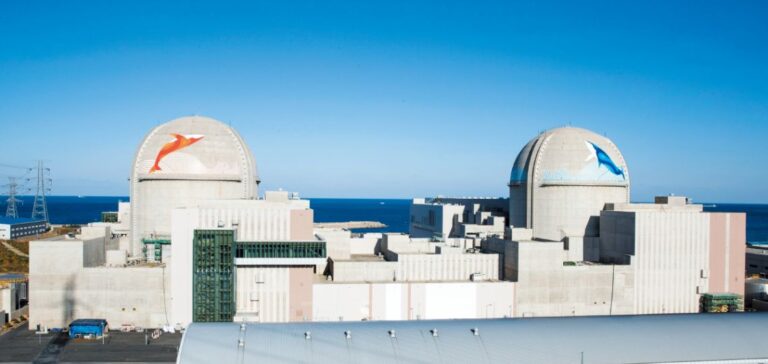South Korea has officially confirmed its 11th Basic Power Supply and Demand Plan, which aims to significantly expand its nuclear capacity to meet rising electricity demand. This plan, covering the period from 2024 to 2038, includes the construction of two new large-scale nuclear reactors and a small modular reactor (SMR) by 2038, in addition to ongoing and planned projects.
Rising electricity demand
The Ministry of Trade, Industry and Energy forecasts an average annual electricity demand growth of 1.8% between 2024 and 2038, reaching 129.3 gigawatts (GW) by 2038—an increase of more than 30% compared to 2023. This rise is primarily driven by the rapid expansion of high-tech industries, including artificial intelligence and semiconductors.
Strengthening the nuclear sector
The plan aims to increase nuclear power generation from 180.5 terawatt-hours (TWh) in 2023 to 248.3 TWh in 2038. As a result, the share of nuclear energy in the country’s power mix will grow from 30.7% to 35.2%. Currently, South Korea’s 26 operating reactors provide about one-third of the nation’s electricity. In addition to the newly planned reactors, the program relies on the completion of five units already under development: Shin Hanul 2, which began commercial operation in April 2024, as well as Saeul 3 and 4 and Shin Hanul 3 and 4, collectively adding 7 GW of capacity.
Deployment of small modular reactors
Alongside large reactors, South Korea plans to integrate 0.7 GW of small modular reactor capacity by 2038. The ministry stated that domestic SMR commercialization is expected by 2035, contingent on technological advancements and regulatory approvals.
Energy transition and diversification
The government aims to reduce coal’s share in electricity generation from 31.4% in 2023 to 10.1% by 2038. Expanding renewable energy is another key priority, with a target of adding 7 GW of new renewable capacity annually by 2030. As a result, the share of renewables is expected to increase from 8.4% in 2023 to 29.2% in 2038.
Strategic policy direction
This energy strategy aligns with the policies of President Yoon Suk-yeol, elected in 2020, who has reinforced the nuclear sector after his predecessor, Moon Jae-in, initiated a gradual phase-out in 2017 following the 2011 Fukushima disaster.





















